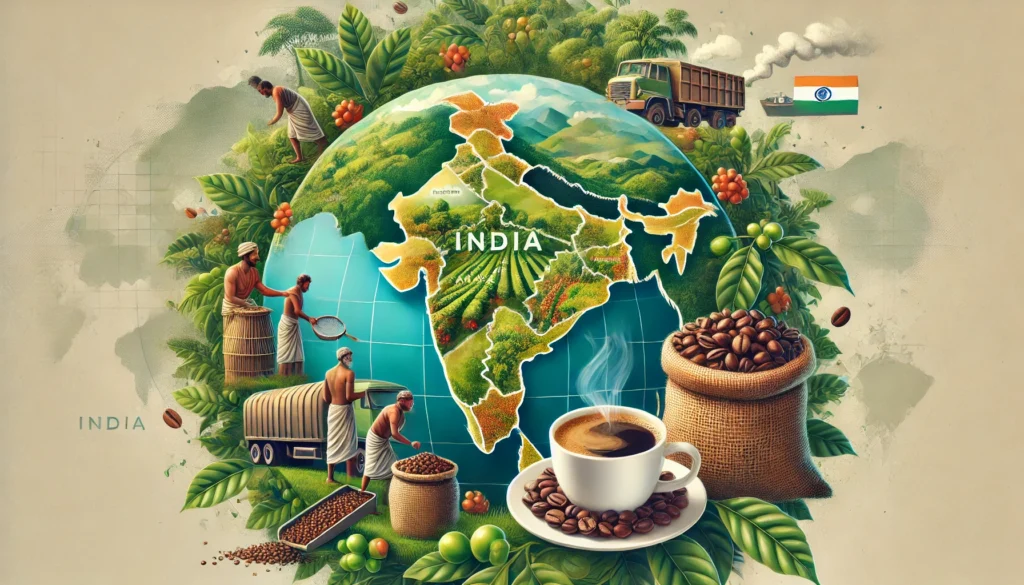
India, known for its rich cultural diversity, is also a prominent player in he global coffee market. With a long history of coffee cultivation and a reputation for high-quality beans, the country has established itself as a key exporter. This article explores the origins, qualities, export destinations, and the vital role of the Coffee Board of India in promoting the coffee industry.
The Origins of Indian Coffee
Indian coffee grows primarily in the southern states of Karnataka, Kerala, and Tamil Nadu, which together form the traditional coffee belt. In addition, coffee cultivation is expanding in Andhra Pradesh, Odisha, and northeastern states, each region imparting unique characteristics to the coffee beans due to differences in altitude, climate, and soil.
Key Coffee-Producing Regions
- Karnataka:
- Regions: Coorg, Chikmagalur, Hassan.
- Characteristics: Known for its robust flavors, Karnataka produces both Arabica and Robusta varieties. These beans often feature a balance of acidity and sweetness with hints of chocolate and nuts.
- Kerala:
- Regions: Wayanad, Idukki, Palakkad.
- Characteristics: Kerala’s coffee is bold and earthy, with Robusta beans being particularly prized for their full-bodied profile.
- Tamil Nadu:
- Regions: Nilgiris, Shevaroys, Pulneys.
- Characteristics: Coffee from Tamil Nadu often has a fruity and floral aroma, making it a favorite for specialty blends.
- Andhra Pradesh and Odisha:
- Regions: Araku Valley.
- Characteristics: Araku coffee, grown in tribal regions, is organic and known for its mild taste with caramel notes.
- Northeastern States:
- Regions: Meghalaya, Nagaland, Manipur.
- Characteristics: Emerging coffee regions in the northeast are gaining recognition for their bright acidity and fruity undertones.
Major Export Destinations for Indian Coffee
India exports coffee to over 50 countries, with Europe and Asia being the primary markets. Key destinations include:
- Italy:
- The largest importer of Indian coffee, particularly Robusta beans used in espresso blends.
- Germany:
- A significant market for Indian Arabica and specialty coffee.
- Belgium:
- Known for its demand for high-quality organic coffee.
- Russia:
- A major importer of Monsooned Malabar coffee.
- USA:
- Increasingly favors Indian specialty and organic coffee.
- Japan:
- Appreciates Indian coffee for its distinct flavors and superior quality.
- South Korea:
- An emerging market for premium coffee varieties.
Quality and Varieties of Indian Coffee
India is recognized for producing both Arabica and Robusta coffee. Its shade-grown coffee enhances flavor and aroma, and the unique monsooning process gives Indian coffee its distinct profile.
Notable Coffee Varieties:
- Arabica:
- Characteristics: Grown at higher altitudes, Arabica coffee is smooth and nuanced, with hints of fruit and floral notes. It is highly prized for its delicate flavors and balanced acidity.
- Market Appeal: Favored by specialty coffee markets worldwide, Arabica is often used in premium blends and single-origin coffees.
- Robusta:
- Characteristics: Known for its strong and full-bodied flavor, Robusta beans contain higher caffeine levels. The taste is earthy and woody, with a hint of bitterness.
- Market Appeal: Widely used in espresso blends and instant coffee production due to its robust crema and cost-effectiveness.
- Monsooned Malabar:
- Process: The beans are exposed to monsoon winds in open warehouses, causing them to swell and mellow.
- Characteristics: This process results in a smooth, mellow flavor with low acidity and a slightly spicy aftertaste.
- Market Appeal: Highly sought after in Europe, especially in Scandinavian countries, for its unique characteristics.
- Organic Coffee:
- Process: Cultivated without synthetic fertilizers or pesticides, adhering to eco-friendly farming practices.
- Characteristics: Clean and pure flavor, often with notes of caramel and nuts.
- Market Appeal: Increasingly popular among environmentally conscious consumers and niche organic markets.
- Specialty Coffee:
- Process: Specialty coffee is carefully processed, graded, and roasted to highlight its unique flavor profile.
- Characteristics: Scores 80+ points on the Specialty Coffee Association (SCA) scale, featuring nuanced flavors and superior quality.
- Market Appeal: Targeted at premium coffee markets and artisanal roasters globally.
- Estate Coffee:
- Source: Single-estate coffees are traceable to specific plantations, ensuring consistent quality and flavor.
- Characteristics: Each estate imparts its distinct terroir, offering unique taste profiles.
- Market Appeal: Highly valued by connoisseurs for its authenticity and consistency.
- Tribal Coffee (Araku Valley):
- Source: Cultivated by tribal communities in Andhra Pradesh, often certified organic.
- Characteristics: Mild acidity with a sweet and creamy finish, complemented by caramel and chocolate notes.
- Market Appeal: Recognized in global markets for its ethical sourcing and premium quality.
- Peaberry Coffee:
- Characteristics: Derived from a natural mutation where the coffee cherry produces a single, round bean instead of two flat ones. Known for its concentrated flavor and smoothness.
- Market Appeal: Considered a specialty product, appealing to gourmet coffee markets.
The Role of the Coffee Board of India
The Coffee Board of India plays a pivotal role in the growth and promotion of the coffee sector. Established under the Ministry of Commerce and Industry, it provides support to coffee farmers and exporters, ensuring the industry’s sustainability and competitiveness.
Key Contributions:
- Research and Development: The Coffee Board invests in improving coffee quality through advanced cultivation techniques and pest management.
- Market Promotion: It organizes events, trade fairs, and campaigns to enhance the global visibility of Indian coffee.
- Financial Support: Provides subsidies and financial assistance to small-scale farmers to improve production and processing.
- Sustainability Initiatives: Promotes eco-friendly farming practices and supports organic coffee cultivation.
- Certification and Branding: Ensures quality through certification programs and helps establish Indian coffee as a premium global brand.
Challenges and Opportunities
Challenges:
- Climate Change: Unpredictable weather patterns impact crop yields and quality.
- Pests and Diseases: Coffee crops are vulnerable to pests such as the coffee borer beetle.
- Price Volatility: Global price fluctuations affect profitability for Indian farmers.
Opportunities:
- Specialty Coffee Market: Rising global demand for unique and high-quality beans.
- Organic and Sustainable Coffee: Increasing consumer preference for eco-friendly products.
- Government Support: Initiatives by the Coffee Board to boost productivity and exports.
Conclusion
India’s coffee export industry reflects the country’s agricultural expertise and commitment to quality. From the fertile plantations of Karnataka to the eco-friendly estates of Araku Valley, Indian coffee offers a diverse array of flavors that appeal to global markets. With the Coffee Board’s support and growing demand for specialty coffee, India is poised to strengthen its position as a leading coffee exporter.
Whether you’re a coffee enthusiast or a stakeholder, exploring Indian coffee is a journey into rich traditions and unmatched quality.


